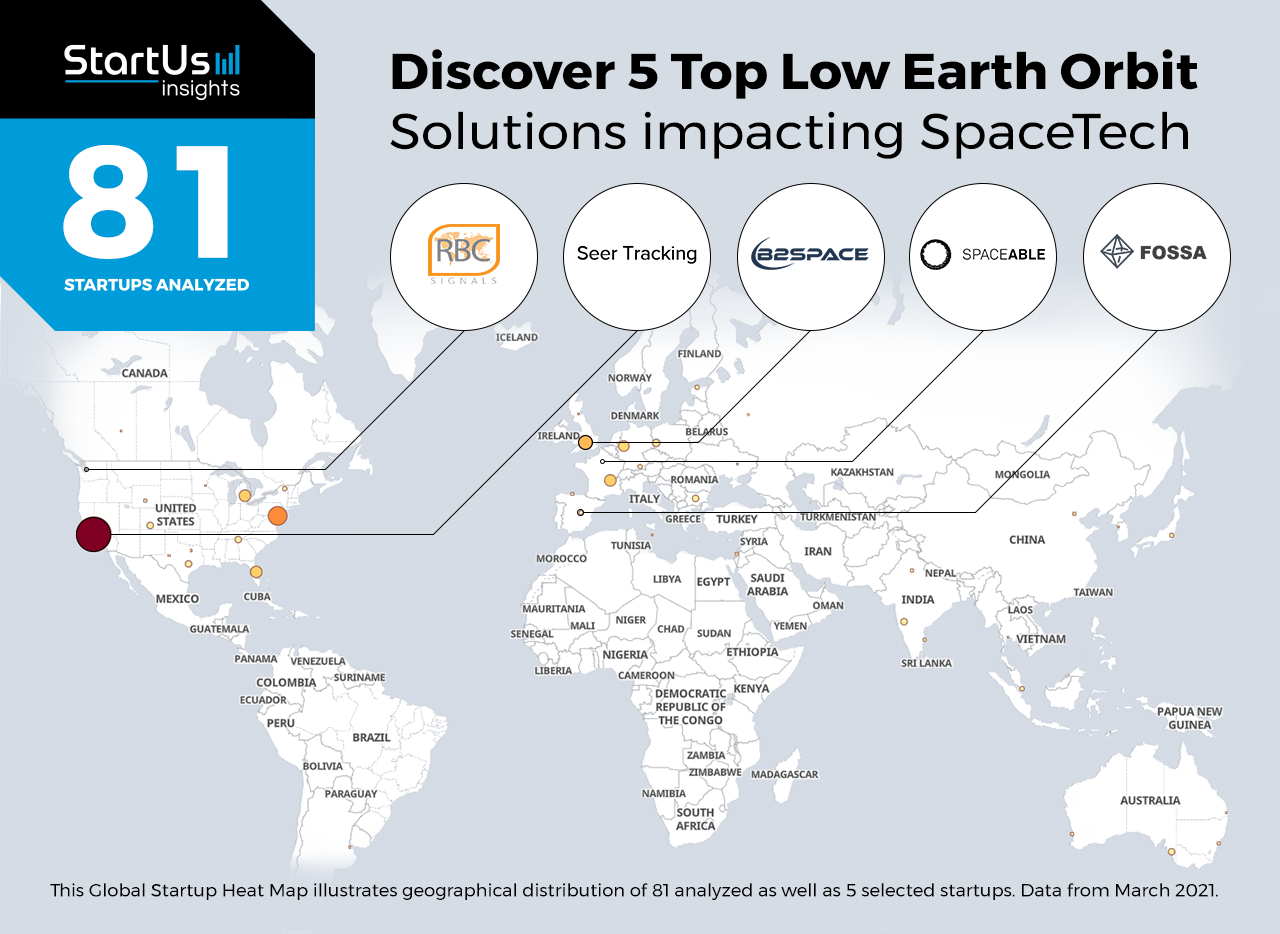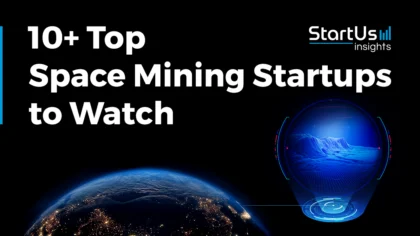Accelerate Productivity in 2025
Reignite Growth Despite the Global Slowdown
Staying ahead of the technology curve means strengthening your competitive advantage. That is why we give you data-driven innovation insights into the space industry. This time, you get to discover 5 hand-picked Low-Earth Orbit solutions.
Global Startup Heat Map highlights 5 Top Low-Earth Orbit Solutions out of 81
The insights of this data-driven analysis are derived from the Big Data & Artificial Intelligence-powered StartUs Insights Discovery Platform, covering 1.379.000+ startups & scaleups globally. The platform gives you an exhaustive overview of emerging technologies & relevant startups within a specific field in just a few clicks.
The Global Startup Heat Map below reveals the distribution of the 81 exemplary startups & scaleups we analyzed for this research. Further, it highlights 5 Low-Earth Orbit solutions that we hand-picked based on criteria such as founding year, location, funding raised, and more. You get to explore the solutions of these 5 startups & scaleups in this report. For insights on the other 76 Low-Earth Orbit solutions, get in touch.
B2Space launches Small Satellites into LEO
Low earth orbits satellites find applications in earth imaging, surveillance, and extended internet connectivity, like the SpaceX Starlink project. Advancements in propulsion and manufacturing enable startups to develop smaller and more functional satellites. Moreover, the cost of launching new satellites is declining, allowing more businesses to enhance their services using satellites.
B2Space is a British startup that launches small and micro-satellites into low earth orbit. The startup’s satellite launch solution, Colibri, comprises a stratospheric balloon with a self-operative platform that deploys the satellite launcher, launching the satellite into orbit. B2Space also offers a near-space testing service, Hawk, for complete satellites and operation simulations. The startup’s low-cost and flexible satellite launch service democratizes space access and facilitates satellites’ deployment for new technologies.
Seer Tracking tracks the LEO Space Debris
Lower earth orbits are dubbed as orbital space junkyards due to millions of space junk flying in orbit. The debris includes pieces of space crafts, flecks of paints, parts of rockets, and more. The debris poses a safety risk for current and future space-based services and space exploration. That is why startups develop debris tracking systems to prevent the damages due to space debris and even retrieve them.
US-based startup Seer Tracking provides accurate debris tracking and mapping solutions for satellite companies, spaceflight operations, and government space agencies. The startup’s software utilizes iterative closest point (ICP) technology in conjunction with AI to provide accurate space debris positioning and tracking. Further, Seer Tracking also provides debris classification and point cloud recognition using ICP 3D data alignment. This enables space project managers in robust planning and implementation.
Fossa Systems develops LEO Picosatellites
CubeSats are low-cost satellites that offer shorter development cycles than conventional counterparts. Their smaller weight and size make them suitable for numerous business applications such as maritime security and Internet of Things (IoT) communication. Moreover, these satellites are also easily deployable without the need for expensive rocket-based launching systems. To this end, startups develop fully functional small and nanosatellites tailored for customer requirements.
Spanish startup Fossa Systems devises picosatellite solutions for low earth orbit applications. The startup’s low-cost FOSSASAT-2 satellite uses the PocketQube platform and has access to 500 km of LEO, with the FOSSA PocketPod Deployer. The deployer is a low-cost and mass manufacturing unit for PocketQube orbital access. The FOSSASat-1 Pocketqube further creates an open-source IoT network and features deployable solar panels and low-power radio frequency communication systems. As a result, the startup’s satellite services ensure payload delivery for aerospace operations in LEO with reduced payload weight and reduced expenses.
SpaceAble provides Situational Space Awareness (SSA)
Lower earth orbits are filled with anthropogenic space objects (ASO) that pose a security risk for functioning satellites. Situational space awareness predicts the movement of ASOs using accurate knowledge of the object’s trajectory and movement pattern. However, this data is limited due to the use of high noise ground-based radar systems, which cannot resolve multiple targets and have high operations and maintenance costs. Startups now develop improved SSA services for enhanced prediction, enabling safer satellite deployment and maneuver.
SpaceAble is a French startup that provides situational space awareness services. The startup’s TheOrbiter solution provides a decentralized approach to provide certified in-situ data of low earth orbit and provide operational safety. To offer these services, SpaceAble utilizes its worldwide stakeholder partnerships, helping operations with critical data. As a result, the startup’s SSA solutions ensure the safety of space travel and exploration, facilitating data-driven planning.
RBC Signals offer LEO Satellite Monitoring Stations
Earth stations passively track visible satellites and also transmit information. They are vital for efficient project management and require dedicated stations for satellite monitoring. Startups offer a worldwide network of satellite monitoring solutions that allow satellite control rooms to track and communicate with satellites. This also eliminates the need for businesses to invest in installing earth stations, reducing project costs and launch time.
US-based startup RBC Signals offers a global network of tracking ground stations for individual spacecraft and constellations in low-earth orbits. The startup’s LEO satellite solutions use very high frequency (VHF), ultra-high frequency (UHF), S, C, X, Ku, and Ka-bands for uplinks, downlink, telemetry, and more. It delivers the data from LEO satellites to the customer servers for further processing. The startup’s solution aids data collection from functioning satellites without new tracking stations, speeding up space projects.
Discover more SpaceTech startups
The 81 startups developing low-earth orbit solutions such as the examples highlighted in this report focus on LEO satellite data and monitoring, debris retrieval & management as well as situational space awareness and small satellites. While all of these technologies play a major role in advancing SpaceTech, they only represent the tip of the iceberg. To explore more space technologies, simply get in touch to let us look into your areas of interest. For a more general overview, you can download our free Industry Innovation Reports to save your time and improve strategic decision-making.








